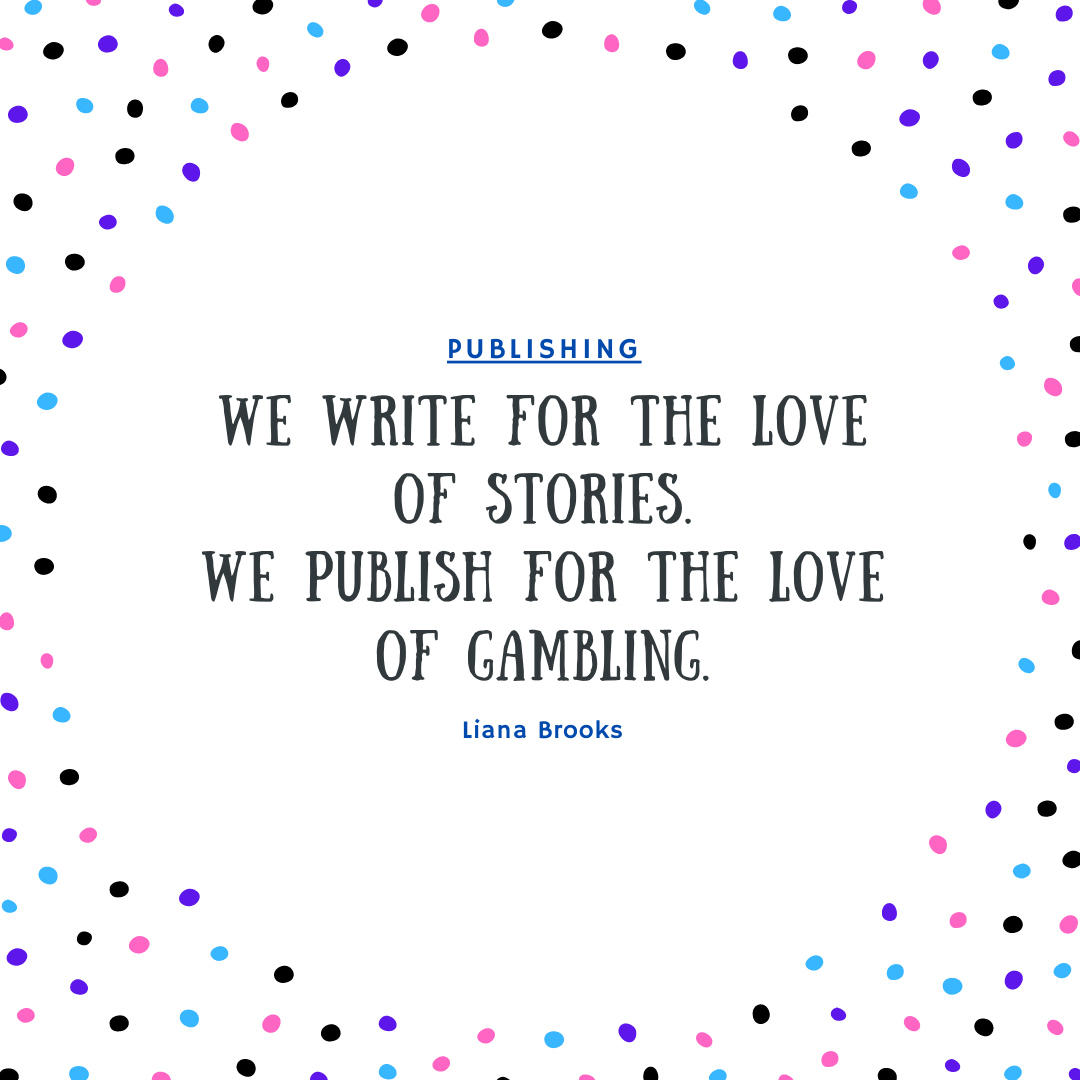AUTHORS – THE MYTH
Let’s start here. Let’s start with what people outside publishing believe because it’s what they see in books and movies.
In the movies authors are generally beautiful. They live in brownstones or airy apartments, or maybe in a cabin with a view of the lake and they spend years doing nothing but sipping coffee while trying to write that perfect story. Which, of course, will happen in a burst of inspiration after they lose their job, find true love, accept their inner gay, or whatever else the plot needed for resolution.
As soon as that first draft is written everything is fine. There’s money for rent, love returns, cancer is cured, and the sun does in fact come out tomorrow. Such joy! Such hope! Such BS!
The author myth is popular but not real.
It’s based, ever so loosely, on publishing of the 1930-1980 span when writing a short book of 100 pages or so could net an author a one time paycheck of $3000.
100 pages of formulaic dime novel writing is doable in under a month. And, with the right formula, an author could write and sell multiple stories a month. There’s where Nora Roberts and Sir Arthur Conan Doyle got their start. Nora lost her job. She needed to feed her kids. She wrote up a quick, fill-in-the-blank romance and sold it. Then another. Then another. And then a few hundred more until she built her empire.
It worked.
Past tense.
WORKED.
It worked for a few people for decades.
And the rest? Well, I’m well read and even I don’t know their names. They wrote a few books and faded into obscurity so grim they had to find other work.
AUTHORS – THE REALITY
What broke authors the most is that the rate of pay in publishing hasn’t gone up much in the past century or two. A few hundred dollars for a short story. The advance on a book (the only pay an author is guaranteed to see on a book) is $3000 – $5000 on average.
That’s it.
An author can spend years writing their book, hundreds of thousands of hours, and then they earn $3000. That’s maybe enough to cover rent and the bills for a month if the author lives in a low-cost area and have no major expenses. But that $3000 was for a 500 page novel, the kind that takes a year or more to write and edit. That $3000 isn’t going to over living expenses for a year.
So the author has a job. Maybe a couple side hustles as a freelance editor, guest lecturer, substitute teacher, or scientist at NASA. They work a forty hour week and squeeze in writing, editing, and publicizing their book on the side. Maybe, if they’re as mad as I am, they have kids and a family too.
Anyone who passed Economics 101 realizes that this amount of work for this low pay is unsustainable and unhealthy. It creates a business model where only those privileged enough to have both wealth and health can easily publish. People working multiple minimum wage jobs, struggling with health problems, providing care for a needy child, parent, or partner, or anything with a job that demands more than 40 hours per week (first responders, care givers, medical staff, ect) probably can’t write every week much less finish a book a month.
The book-a-month model is what keeps indie authors afloat. The majority of successful indies (especially in romance and erotica) rely on a steady output of shorter books to keep the money coming in. It’s modeled off the older style of serial publishing and it can be lucrative… but the pirates and scammers will always do it better.
Because reality, unlike the beautiful myth in the movies, comes with some very nasty setbacks.
Scammers: Since the arrival of ebooks and Kindle Unlimited the scammers have become major players in the publishing industry. They take books, change a few names, and re-publish the duplicates under their own name. Often they have multiple names and multiple accounts. They game the system to make money off KU and very little is done to stop them. Tracking down stolen and republished copies of your work can be frustrating and at times impossible.
Pirates: Publishing is built on the Luxury Model, which means there are limited prints, high prices, and a healthy second-hand market. Pirates skip right over this by stealing digital copies and handing them out for “free”. I use quotation marks because most illegal downloads come with a nice virus or other malware. In recent weeks someone has been uploading scanned books to the internet under the guise of being a “Free Library” which suggests they don’t understand how libraries work at all. Either way, the end result is no paycheck for the author, no sales, no paycheck, and your hungry author gets hungrier.

Pirates vs Libraries
And here’s another myth we need to debunk: the library books aren’t free.
Library books are free TO YOU, because library books are bought with your tax dollars.
The argument that keeps bubbling up in every discussion about stolen books handed out to “the people” is 1) The Robin Hood Agenda and 2) Libraries Are Free!
Libraries aren’t free. Libraries are a socialist experiment. Libraries are funded by local tax dollars and federal grants so that everyone in the community can have access to things like: books, internet, classes, movies, cookware, and more. Patrons get to take that home for free. But everything you use in the library was paid for.
The books at the library? The authors got paid for those.
The movies you rent from the library? Those were bought at a store.
Everyone gets paid in this scenario.
In the pirate libraries, that doesn’t happen. The books aren’t bought, they are stolen. The authors don’t get paid. The editors don’t get paid. The cover artists don’t get paid.
No one gets paid (except maybe the pirate if they’re able to put malware on your device).
And it isn’t a situation that fits the Robin Hod Agenda (steal from the rich to give to the poor).
On average an American author earns $6000 a year. That’s factoring in the Big Name bestsellers who earn tens of thousands (a comfortable middle class income) and everyone down at the bottom of the list making $30/yr from book sales.
Possibly the most important function of a library (from the publisher’s perspective) is that a library records which books are checked out and which books are requested. All of those are considered when an author writes something new and wants to be published again. The more a book is borrowed and requested, the more likely the publisher will be to pay for the next book by that author.
This is especially important for the sale of a series. Authors often sell only the first book of a series. The publishers will wait for the sales of that book to decide if they should acquire a second book. If the book is pirated more than it sells, the series dies.
There is no mechanism in piracy to support the author or show the publisher that a book is well-liked. A lack of sales means the author won’t earn-out their advance (the $3000) or make an royalties. The money invested by the publisher, whether a publishing house or the author who is self-publishing, is never recouped. The series is dead and it will be that much harder for the author to sell their next book.

LIFE AS A PUBLISHED AUTHOR
I told a friend not to long ago, “We write for the love of stories. We publish for the love of gambling.” because that’s what publishing is: a gamble.
It isn’t enough to have a good book or great publicity, those help, but at the end of the day the author can only control so much.
Authors can’t force people to buy our books. We can’t magically make everyone love our books (trust me, we’ve tried). We can’t control the market, buyer’s willingness to spend, the mood of the country, or publishing the same day as a huge, well-loved author.
Good books – great books! – get missed all the time.
There are so many amazing authors with amazing stories out there and even people who read six books a week can’t keep up. So, will a book hit? It’s like winning the lotto… a small, regional lotto where most the money gets paid in taxes and you may never hit it big again.
Writing a book is hard.
Editing a book is hard.
Getting a book published is hard.
Getting people to buy your book is hard.
To get a book to the point where someone can steal it the author has already charged through hell, jumped through hoops of fire, looked into the abyss and walked about with (most of) their sanity intact.
And then someone tells the author that they should be willing to starve for their art and takes the book from their hands.
It’s not the sort of thing that encourages authors to write the next book.
It is the sort of thing that actively discourages new writers, young authors, and diverse authors. It actively keeps people from low income backgrounds, people with disabilities, and people in less stable circumstances from creating. If you only have so many free minutes a day and you know your work would be stolen, would you try to publish it? A lot of people find they can’t justify spending the time and effort on something that will bring them nothing. No one wants to spend the precious free time they have in something that will only bring tears and heartbreak.
So… there it is… the truth behind publishing.
When you pull away the Hollywood props what you have is hard working people trying to make the world a better place. People who deserve respect and a living wage. People you can support even if you’re broke, because the library is right there.
Have another author myth you want debunked? Hit me up in the comments!



Wow, looks good, especially the conclusion. I
was looking for that topic for a few days throughout the nest, but there was nothing valuable, only found this https://america2040.com/, but still so
pleased to reach your post in the end. I’m keen on that subject, and I want to be always conscious of the most recent news.
That’s a joy to read your article and finally clarify the issue myself.